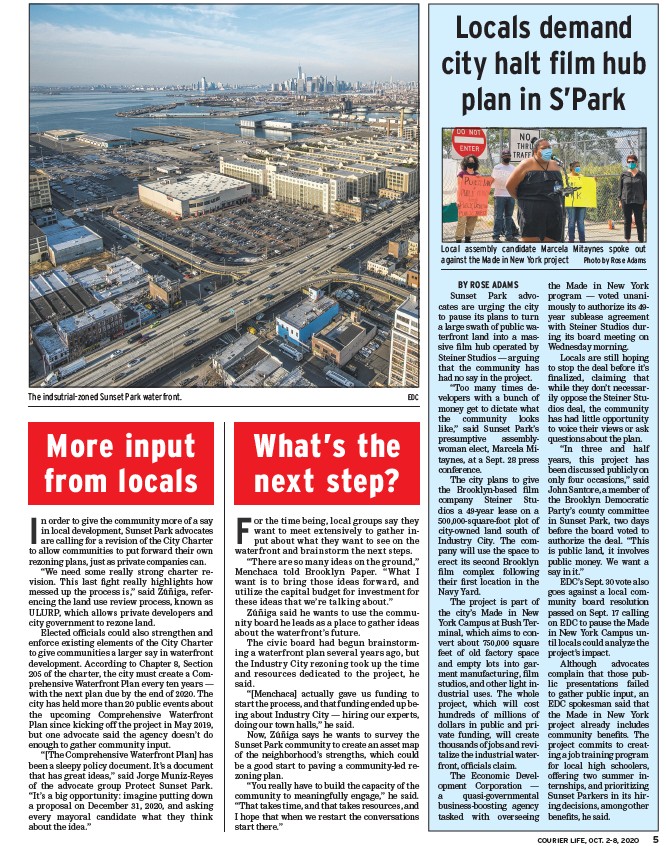
Local assembly candidate Marcela Mitaynes spoke out
against the Made in New York project Photo by Rose Adams
BY ROSE ADAMS
Sunset Park advocates
are urging the city
to pause its plans to turn
a large swath of public waterfront
land into a massive
fi lm hub operated by
Steiner Studios — arguing
that the community has
had no say in the project.
“Too many times developers
with a bunch of
money get to dictate what
the community looks
like,” said Sunset Park’s
presumptive assemblywoman
elect, Marcela Mitaynes,
at a Sept. 28 press
COURIER LIFE, OCT. 2-8, 2020 5
conference.
The city plans to give
the Brooklyn-based fi lm
company Steiner Studios
a 49-year lease on a
500,000-square-foot plot of
city-owned land south of
Industry City. The company
will use the space to
erect its second Brooklyn
fi lm complex following
their fi rst location in the
Navy Yard.
The project is part of
the city’s Made in New
York Campus at Bush Terminal,
which aims to convert
about 750,000 square
feet of old factory space
and empty lots into garment
manufacturing, fi lm
studios, and other light industrial
uses. The whole
project, which will cost
hundreds of millions of
dollars in public and private
funding, will create
thousands of jobs and revitalize
the industrial waterfront,
offi cials claim.
The Economic Development
Corporation —
a quasi-governmental
business-boosting agency
tasked with overseeing
the Made in New York
program — voted unanimously
to authorize its 49-
year sublease agreement
with Steiner Studios during
its board meeting on
Wednesday morning.
Locals are still hoping
to stop the deal before it’s
fi nalized, claiming that
while they don’t necessarily
oppose the Steiner Studios
deal, the community
has had little opportunity
to voice their views or ask
questions about the plan.
“In three and half
years, this project has
been discussed publicly on
only four occasions,” said
John Santore, a member of
the Brooklyn Democratic
Party’s county committee
in Sunset Park, two days
before the board voted to
authorize the deal. “This
is public land, it involves
public money. We want a
say in it.”
EDC’s Sept. 30 vote also
goes against a local community
board resolution
passed on Sept. 17 calling
on EDC to pause the Made
in New York Campus until
locals could analyze the
project’s impact.
Although advocates
complain that those public
presentations failed
to gather public input, an
EDC spokesman said that
the Made in New York
project already includes
community benefi ts. The
project commits to creating
a job training program
for local high schoolers,
offering two summer internships,
and prioritizing
Sunset Parkers in its hiring
decisions, among other
benefi ts, he said.
The indsutrial-zoned Sunset Park waterfront. EDC
Locals demand
city halt fi lm hub
plan in S’Park
More input
from locals
In order to give the community more of a say
in local development, Sunset Park advocates
are calling for a revision of the City Charter
to allow communities to put forward their own
rezoning plans, just as private companies can.
“We need some really strong charter revision.
This last fi ght really highlights how
messed up the process is,” said Zúñiga, referencing
the land use review process, known as
ULURP, which allows private developers and
city government to rezone land.
Elected offi cials could also strengthen and
enforce existing elements of the City Charter
to give communities a larger say in waterfront
development. According to Chapter 8, Section
205 of the charter, the city must create a Comprehensive
Waterfront Plan every ten years —
with the next plan due by the end of 2020. The
city has held more than 20 public events about
the upcoming Comprehensive Waterfront
Plan since kicking off the project in May 2019,
but one advocate said the agency doesn’t do
enough to gather community input.
“The Comprehensive Waterfront Plan has
been a sleepy policy document. It’s a document
that has great ideas,” said Jorge Muniz-Reyes
of the advocate group Protect Sunset Park.
“It’s a big opportunity: imagine putting down
a proposal on December 31, 2020, and asking
every mayoral candidate what they think
about the idea.”
What’s the
next step?
For the time being, local groups say they
want to meet extensively to gather input
about what they want to see on the
waterfront and brainstorm the next steps.
“There are so many ideas on the ground,”
Menchaca told Brooklyn Paper. “What I
want is to bring those ideas forward, and
utilize the capital budget for investment for
these ideas that we’re talking about.”
Zúñiga said he wants to use the community
board he leads as a place to gather ideas
about the waterfront’s future.
The civic board had begun brainstorming
a waterfront plan several years ago, but
the Industry City rezoning took up the time
and resources dedicated to the project, he
said.
“Menchaca actually gave us funding to
start the process, and that funding ended up being
about Industry City — hiring our experts,
doing our town halls,” he said.
Now, Zúñiga says he wants to survey the
Sunset Park community to create an asset map
of the neighborhood’s strengths, which could
be a good start to paving a community-led rezoning
plan.
“You really have to build the capacity of the
community to meaningfully engage,” he said.
“That takes time, and that takes resources, and
I hope that when we restart the conversations
start there.”